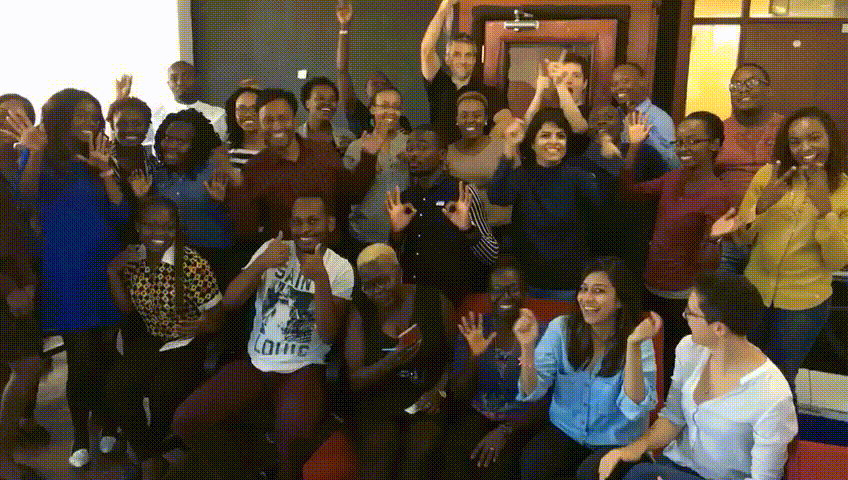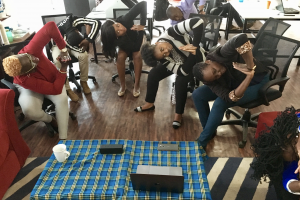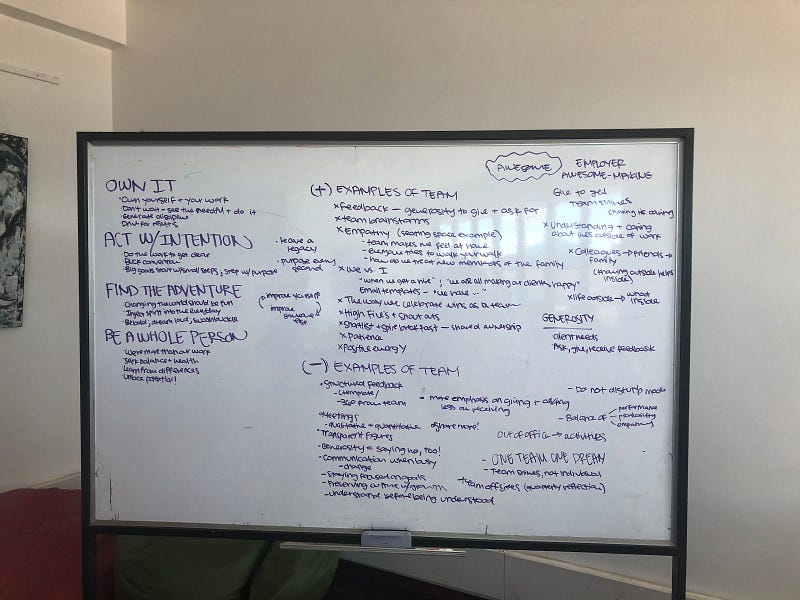We believe that talent is global and the strongest teams are borderless. The digital-first jobs of tomorrow — engineers, data scientists, digital marketers and content creators — can be done by anyone, anywhere as distributed teams, as long as they have the right skills, a computer, and wifi access.
The rise of global freelance marketplaces like Upwork, Fiverr, and Toptal is a bellwether, but so is the increasing number of firms that choose to be distributed from the start, with teammates scattered across living rooms, coffee shops, and WeWorks, and connected through Slack, Zoom, and WhatsApp. Some investors have gone as far to proclaim that distributed teams are the “new cloud for startups.”
The concept of a global distributed team is deeply ingrained in our Shortlist DNA. We launched in two markets (India and Kenya) nearly simultaneously, and today have three offices across two countries, along with consultants and board members in New York City, Washington DC, San Francisco and Mauritius (not to mention clients in 12+ countries).
We certainly still believe in the power and the magic of working (mostly) alongside our teammates. Special things can happen when brainstorms are done in person with a whiteboard, when data can be explained while pointing at the same screen, and when relationships can be formed over regular coffee or lunch meetings rather than just messaging platforms.
But with 80+ Shortlisters in across our Nairobi, Mumbai, and Hyderabad offices, we’ve become thoughtful and creative about how best to build a #OneTeam culture and generally get stuff done efficiently and to our high standards. So what are some of the things that have worked for us in operating through distributed teams?
1. Create spaces for chatter and personality
Because we can’t count on the spontaneous collisions of a single shared space to deepen connections, we have had to create these opportunities digitally. We have a series of WhatsApp groups keyed to different logical divisions (by geography, function) where there’s a steady flow of welcomes, birthday wishes, photos of social events, GIFs, and more. It’s the modern day company-wide water cooler.

We also have a weekly Zoom call among the senior leadership, which is less a space for substantive discussions and decisions, and more space to just chat and catch up. Each person has a lightly structured few minutes to share travel plans, a mood check, points of nervousness and points of celebration, which usually involves a lot of venting, movie references, and vacation longing. It’s the one time when no one cares if you take the call from the back of an Uber.
2. Institute a global social operating system
As we’ve built and tweaked our social operating system (i.e., the processes and tools in place to ensure an efficient flow of information and decision-making), we’ve done so at a global and local level. It’s helpful when everyone is on the same page about how we structure functional team check-ins, send calendar invites, and join video chats – especially when they’re happening remotely!
We have quarterly Town Halls where we attempt an (often fraught) global video-conference, with all the offices beaming in (below are all three distributed teams tuned in to our most recent Town Hall). The meeting features updates on important stuff, but also introductions to new folks, celebrations of promotions, and cross-office “high fives,” where the Kenya team gives shout outs to members of the India team and vice versa. It’s a valuable chance to express recognition of great work to team members who you won’t have a chance to thank in person.

3. Invest in “unnecessary” travel for distributed teams
We accept that part of the cost of multiple offices is increased travel bills. We make sure to budget for frequent flights between Hyderabad, Bombay and Nairobi – for the senior functional heads, of course, but also for more junior managers on the team.
These visits serve a critical culture transmission-and-smoothing tool, as teams learn from the visitor (who is usually extra motivated to go out for some local food, drinks and adventures) and the visitor brings back lessons and perspective to their home office. Below are snapshots from Product Manager Austen and Talent Advisor Mehndi’s visits to the Mumbai and Nairobi offices.

4. Commit to annual retreats

While this can sometimes feel like a scary line item in a startup budget, I highly recommend committing to gather parts or all of your distributed teams together in one place on a regular basis. Our leadership team meets for a retreat at least once a year (here we are during an epic brainstorming session) and we make sure to find a place that feels suitably adventurous: the hills of Lonavla outside Mumbai; a house on the shore of Lake Naivasha outside Nairobi.
It’s an incredible opportunity to push strategy forward but also go deep as teammates and as whole people, and have a little fun as well. We also recently invested in an “All-India” retreat bringing together the Mumbai and Hyderabad offices at one resort for a couple days of programming, a “gala” evening of team appreciation, and a surprisingly competitive cricket match.
5. Don’t cheap out on phones, speakers and internet
This should probably be #1! We’ve cycled through so many different pieces of technology in hopes of finding the Holy Grail of cross-border communication. Would that Pied Piper’s video calling were real!
The best answer we’ve come to (and we’re not being paid to say this): the Jabra 510, a steal at $110. We have a few Jabras and it takes us from our standard sequence of “Hello?… Can you hear us?… What?… Switching wifi to data… Seems there’s a delay… There’s an echo… Let me try you back…” (you know you’ve been there!) to a welcome sense of “We’re in the room together” crispness and clarity. Even better is when we get video working: we’ve had a lot more luck with Zoom than Google Hangouts or Skype but we’re still hunting for The Answer!
6. Enshrine and preserve the important stuff at a global level…
We’ve had to be even more deliberate and intentional about defining our global values, culture and identity, given the fact that we can’t count on it to simply “emerge” from the great people we have sitting around the same table. We spent significant time on our core values (read how we did it here and here), and we make sure to highlight these values and recognize the importance of company-wide culture and ways of working together at every chance we get.
Last year our co-founder Matt started an internal “values podcast” in which he interviewed folks on the team about their personal stories and journeys to Shortlist, including a deep dive on the person’s favorite value and what it means to them. It’s been amazing to draw out the different dimensions and texture of our values that are important, deepening the words beyond just posters on the wall.
7. …but let local be local

At the same time, not everything can be global. We have such vibrant teams and offices in our two markets, and there is plenty of space for local innovations: from our Holi parties to games of Kahoot to First Friday team brainstorms to “Biggest Loser” fitness challenges to “Wellness Wednesday” self-care breaks (check out that chair yoga!) to the once-famous “Meditation Room” to the Snack Wars to the After-Hours Ping Pong Tournaments to the chai breaks to the Throwback Thursdays (game of “guess who” with childhood pictures) to Friday Jam Sessions (with guitars and beers), each office has found unique rhythms and rituals and inside jokes to keep things fun and human.
8. Cherish the diversity

One of the best parts of building global distributed teams is that there are so many differences across the group, and so many opportunities to learn from each other. Beyond national diversity, we’re proud that 75% of our senior leadership and 65% of our global team is female. We celebrate a range of Hindu, Muslim, Jewish and Christian holidays, we sample foods from all over India and Kenya, we learn from the dramatically different life experiences of folks who have grown up in all sorts of different circumstances, went to all sorts of different schools, come from all sorts of different prior jobs.

This is magical and fun and one of the most enriching parts of my job, so while building that global team, don’t forget to embrace and enjoy the differences!
To be clear, we haven’t figured it out and we’re always looking to make improvements, learn, grow. We’d love to hear how others do it out there. If you’re on a team that’s distributed across multiple locations or has multiple offices, how do you make it work? Any tricks, tactics or tools you can share? Let us know; this is only going to become more common and more pressing for all of us to figure out!










































